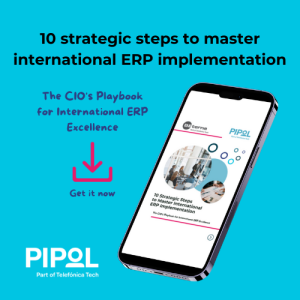Data-driven decision-making is the new black

No matter if your company is big or small, or what industry you operate in, you need to control your data before you can grow. Therefore, the ability to control data is a key driver for transforming a company’s digital backbone. With new technologies, data has become far more accessible and integrable. In fact, data has become the focal point for every decision your company makes.
Once you have control of your data, you will know where to improve and how to grow. What does it take, then, to be in control? The typical scenario is a disconnected backend with different systems and silos of data which makes it very difficult to get an overview of how the company truly performs across countries and to predict how the company will perform in the future. You need one common platform for all data. But you may also need to prioritize data over processes.
How so? Implementing an ERP system across borders requires harmonization of processes and data. Harmonizing processes across the business has, over the years, been the focus area, although many international companies struggle with this. Different organizational processes and different local customs and cultures are difficult to harmonize. With data and new, modern data and analytics tools becoming more accessible, it is easier and more value-creating to harmonize data before processes.
In an international ERP transformation, the goal of harmonizing processes is often to create operational synergies between entities to establish group best practices and enable easy and consistent consolidation and reporting, e.g. by implementing global Chart of Accounts. However, from a strategic viewpoint, harmonization of data allows you to compare accurate information across countries and make truly data-driven decision-making. This is what drives growth. Therefore, to maximize the value of your new group ERP platform, data harmonization should be a key focus area – you can adapt processes accordingly.
The nature of data analytics has changed remarkably with new technologies enabling AI, IoT, machine learning, and automation. Today, data analytics supports not only analysis of internal, historical data, including consolidated group reporting, but also predictive analysis. Data analytics enables more precise budget forecasts as well as explorative business development. You will be able to develop new digital services for customers that go beyond the company’s core services. Therefore, access to all types of data from all your subsidiaries around the world as well as intelligent analysis of this data become increasingly important for your company’s competitiveness.
With more data sources available and advanced data analytics, you can predict, for instance, customer behavior and churn, minimize costs for machine maintenance and predict machine breakdowns, automate routine paperwork and documentation, etc.
The first step is to take a holistic view on the entire business and ask yourself what you want to achieve. You need to stabilize internal data with the right data models. Country by country you implement ERP and integrate more intelligence to make more sophisticated analyses. There is no need to be overwhelmed by complexity. You start with the areas where data offers your business most possible value with the least possible effort. Soon, you will discover how truly data-driven decision-making simplifies and boosts your way towards international growth.





